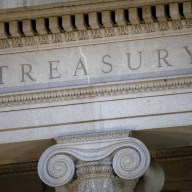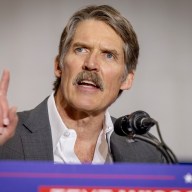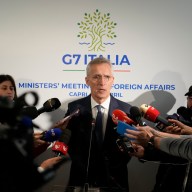COPENHAGEN, Denmark – Stephen Harper kept a low profile on his first day at the Copenhagen climate summit, turning down an opportunity to speak to the gathering, amid high hopes for a breakthrough over a $1-trillion American plan.
The prime minister hobnobbed with other leaders at a royal dinner hosted by the queen of Denmark, passing up the chance to deliver Canada’s address to the UN climate talks late Thursday. Instead he delegated the job to Environment Minister Jim Prentice.
A number of other leaders also opted to break bread with Danish royalty instead of addressing the conference. But they were reminded of the business at hand when a pair of Greenpeace activists crashed the banquet, unfurling two banners reading “Politicians Talk, Leaders Act” before they were dragged from the hall by security guards.
Prentice’s three-and-a-half minute speech reiterated many of the Conservative government’s stated positions on climate change. They include the contentious notion that any deal in Copenhagen should replace the Kyoto Protocol, rather than the complementary “Kyoto-plus” option supported by developing countries.
“Our actions to address climate change take into account our large, diverse landmass, our growing population and the importance of our energy sector for meeting global demand,” Prentice said.
“Our approach also reflects the strong economic ties between Canada and our neighbour the United States, and the need to ensure our actions are aligned with our continental partners.”
He spoke just after midnight local time at the Belle Centre conference hall where the climate talks are being held.
Prentice’s speech is unlikely to ease criticism from developing countries and environmentalists who accuse Canada of failing to make concessions to help reach a deal – and of relinquishing its historic role as a progressive on the world stage.
His address came after U.S. Secretary of State Hillary Clinton offered to help raise $100 billion a year for the next decade to help the most vulnerable nations cope with a warming planet.
That includes an unspecified American contribution which would include mix of public and private money. But there’s a couple of catches: countries must agree to a climate deal in Copenhagen, and all must agree to “transparency” in reporting and verifying cuts to greenhouse gases.
The latter condition was clearly directed at China, which has balked at what it sees as an intrusion on its sovereignty.
Clinton said lack of transparency is a “deal breaker” and insisted: “There shall be a transparency requirement.”
“It would be hard to imagine, speaking for the United States, that there could be the level of financial commitment that I have just announced in the absence of transparency from the second-biggest emitter – and now I guess the first-biggest emitter – and now nearly, if not already, the second-biggest economy.”
China’s vice-foreign minister, He Yafei, called the offer a “good first step.” He said China is ready for “dialogue and co-operation” on its emissions actions “that is not intrusive, that does not infringe on China’s sovereignty.”
Prentice said Canada is ready to contribute to a climate-aid fund, but wouldn’t speculate on a number. He said Canada would open its books and he expects China to do the same once a climate deal is signed.
“I don’t think it’s a question of a phasing-in of those arrangements,” he said earlier Thursday. “Rather, it’s a question of an agreement that has to apply to all major emitters, and has to have transparency as a fundamental principle of it.
“Transparency isn’t something that can be phased in. And so we are interested in measurement arrangements, reporting arrangements, verification arrangements that withstand scrutiny from the outset.”
The U.S. offer was aimed at breaking a deadlock as the climate talks head into their final day Friday. There have been major disagreements between rich and developing countries on greenhouse-gas cuts and aid to poor countries most affected by climate change.
The U.S., Canada, the EU and others insist that developing countries – especially big emitters like China and India – must be full partners in any pact to reduce emissions. Developing countries counter that rich nations can afford to do more.
Leaders from over 100 countries – including Harper and U.S. President Barack Obama – were arriving in Copenhagen for the summit’s final hours. It’s hoped the leaders’ presence will push some sort of a deal across the finish line.
Australian Prime Minister Kevin Rudd showed his frustration Thursday over what he called an “avalanche of procedural interventions” that have stalled the talks.
“I fear a triumph of form over substance. I fear a triumph of inaction over action,” he said. “Let us instead as leaders resolve to decide for the future, not simply to defer the future.”
The UN’s top climate official announced Thursday that the talks would continue along two tracks: one for countries that signed the Kyoto Protocol and another for those that didn’t. That’s despite calls from Canada and other rich nations to mothball Kyoto in favour of a new climate deal.
The Harper government’s preference was to roll all or parts of Kyoto into a new climate deal that includes all the big polluters, namely the United States and China. The developing world wants countries that ratified Kyoto – including Canada – to stick to their commitments.
Canada leads the pack in Fossil of the Day awards, a dubious citation bestowed by environmental groups to the daily climate laggard. And provincial leaders, notably Quebec Premier Jean Charest, have assailed Ottawa for not doing enough to get the country’s emissions under control.
Environmental groups, opposition MPs and some European countries complain Canada’s targets for emissions cuts aren’t steep enough. The Conservatives aim to lower Canada’s greenhouse gases 20 per cent from 2006 levels by 2020 – well short of Canada’s Kyoto commitments.
The Conservatives counter that achieving Canada’s Kyoto commitments now would batter the economy because of years of inaction by their Liberal predecessors.















